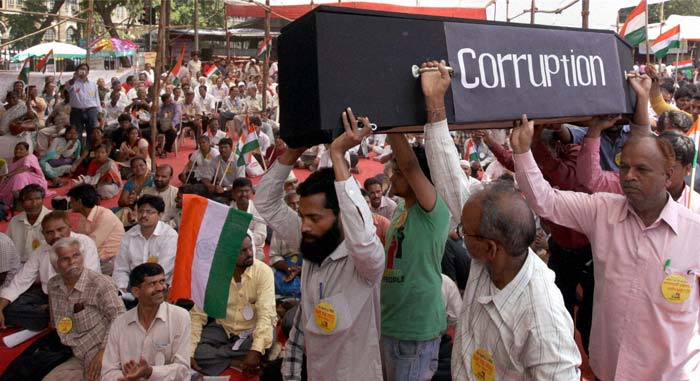Part 2 – Mood on the Ground
Also Read: Part 1: Many Barrels of a Gun
“There’s this contagion of protest,” Richard Stengel, managing editor of TIME, told NBC television as he discussed the naming of “The protester” as Time magazine’s person of the year, 2011. “These are folks who are changing history already and they will change history in the future.”

People across the SAARC region took to streets to protest against administrations failing to deliver governance
While he was referring largely to the people on streets in the Arab world, from Tunisia to Syria, who are shaking the plates of autocratic regimes in the region, the one story from the SAARC region that captured the imagination of the world in much the same way was the anti-corruption movement in India led by veteran social activist Anna Hazare and his team, known together as Team Anna.
In a protest that replicated the span and fervour of the Tahrir Square protest in Egypt, Team Anna’s agitation at Ramlila Maidan in India’s capital city of New Delhi towards a strong anti-corruption law drew not just tens of thousands of supporters (largely from the middle class) to the venue, but also inspired hundreds of simultaneous mirror agitations across the nation of 1.2 billion.
With more than 100 Indian news channels in over 20 languages and thousands of newspapers and magazines from across the globe providing saturation coverage to the movement, the Indian political class was forced to call an unscheduled debate on the subject in the parliament. It was an unprecedented instance of people power prevailing over the mighty political class in the nation’s 60-year-old parliamentary history.
There has yet not been any conclusion of the debate, both inside and outside the parliament, but what has now been established beyond doubt that people’s pressure in a nation that is home to the world’s fastest growing middle class may set the tone for future government-civilian dynamics.
Already, the Indian government is facing unrelenting resistance on ground over issues ranging from environmental and health impact of nuclear power plants to prices of essential items like food and fuel.
Clearly, the tone for the future is now set in India. People’s pressure would increasingly ensure that governance delivery becomes one of the prerequisites for electoral victories.
The thread carries through neighbouring Pakistan too. Hundreds of thousands of people have been flocking the political rallies of one of the nation’s favourite sons, Imran Khan. The only reason that can describe the massive surge in support for a person whose party has never, in the 15 years of its existence, won a single election is the unprecedented levels of public frustration in the nation about the current state of affairs.
Social media savvy middle and upper class youth are flocking Khan’s rallies across Pakistan in the hope that the charismatic personality would turn around things in the poverty and terrorism-stricken nation.
Sweeping one city after another by his present crowd pulling charisma, Khan has sent both the current ruling coalition and the principal opposition in a tizzy at the same time. Out of nowhere, Khan is now seen as a serious prime ministerial choice by an increasing number of people in the country.
Most of the support group of Khan see him not just as an alternative, but also as an extension of their own belief. In other words, Khan is just a representative of the present mood, which may just as easily turn against him should he compromise on any of the urgent expectations of the man on the street on the subject of transparent and corruption free government.
It is a thread that seems to be running across the SAARC region.
Bhutan, which famously talks of Gross National Happiness in place of Gross Domestic Product, saw an unprecedented Facebook campaign in February that challenged the government’s decision to ban smoking at public places. Though most of the supporters of the Facebook group had attacked the government from behind hidden identities, the rise of people’s voice in an otherwise serene kingdom did not go unnoticed. What also brought into sharp focus was the opportunity for administrative corruption in the process of the implementation of the law.
Three months later, thousands of people protested in Male, Asia’s smallest city and the capital of Maldives, against what they dubbed as corruption of unacceptable proportions in the government.
All of the above instances are significant as they belong to a region that is traditionally identified with corruption. A recent report by Transparency International on corruption in daily lives and public opinion in South Asia, based upon a survey of 7500 persons in six countries—India, Nepal, Pakistan, Maldives, Bangladesh and Sri Lanka, revealed that more than one in three people in the SAARC region who dealt in public services said they paid bribes to get things done.
The report further said that people in the SAARC region see political parties and police as the most corrupt institutions. The two Ps are closely followed by further two Ps—parliament and public officials.
In such an environment of near pathological acceptance of corruption as a part of the society, rise of masses against corruption is not only a welcome sign, but might also signify the fight back of an extremely aggressive beast that feels itself to be cornered from all sides.
And therein lay SAARC region’s sunshine story of the year 2011.
End of Part 2